Lista deista
Izgled
(Preusmjereno sa stranice Popis deista)
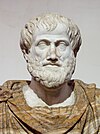

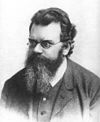






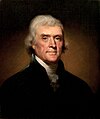
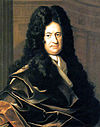


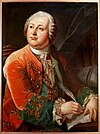

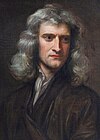
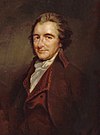




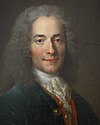

Ovo je djelomičan popis ljudi koji su kategorizirani kao deisti, vjerovanje u Boga zasnovano samo na prirodnoj religiji ili vjerovanje u religijske istine koje su otkrili ljudi procesom razumijevanja, neovisno o svakoj objavi u svetom pismu ili od proroka. Oni su izabrani zbog svoga utjecaja na deizam ili zbog svoje slave u ostalim područjima.
- Jean le Rond D’Alembert (1717. – 1783.), francuski matematičar, mehaničar, fizičar, filozof i muzički teoretičar. Također je bio suurednik s Denisom Diderotom na Enciklopediji.[1]
- Ethan Allen (1738. – 1789.), rani američki revolucionar i gerilski vođa.[2]
- Luis Walter Alvarez (1911. – 1988.), američki eksperimentalni fizičar i pronalazač koji je proveo gotovo svu svoju dugu profesionalnu karijeru na fakultetu Kalifornijskog sveučilištu u Berkeleyju. Nobelovu nagradu za fiziku dobio je 1968. godine, prijavio je preko 40 patenata od kojih su neki doveli do komercijalnih proizvoda.[3]
- Anaksagora (o. 500. – 428. pr. Kr.), predsokratski grčki filozof.[4]
- Aristotel (384. pr. Kr. – 322. pr. Kr.), grčki filozof i polihistor, učenik Platonov i učitelj Aleksandra Velikog.[5][6][7]
- Neil Armstrong (1930. – 2012.), američki astronaut NASA-e, testni pilot, aeronautički inženjer, sveučilišni profesor, američki mornarički letač i prvi čovjek koji je stupio na Mjesec.[8]
- Averroes (1126. – 1198.), andaluzijski polihistor; magistar aristotelovske filozofije, islamske filozofije, islamske teologije, malikijskog prava i jurisprudencije, logike, psihologije, politike, arapske muzičke teorije, te znanosti medicine, astronomije, geografije, matematike, fizike i nebeske mehanike. Rođen je bio u Córdobi u Al Andalusu, danas u Španjolskoj, a umro u Marakešu u Maroku. Njegova škola filozofije poznata je kao averoizam.[9][10]
- Ludwig Boltzmann (1844. – 1906.), austrijski fizičar slavan po svojim osnivačkim doprinosima u polju statističke mehanike i statističke termodinamike.[11][12]
- Napoleon Bonaparte (1769. – 1821.), francuski vojni i politički vođa.[13]
- Max Born (1882. – 1970.), njemačko-britanski fizičar i matematičar koji je posredovao u razvoju kvantne mehanike. Također je doprinio fizici krutog stanja i optici, a nadzirao je rad brojnih značajnih fizičara tijekom 1920-ih i 1930-ih. Born je 1954. godine osvojio Nobelovu nagradu za fiziku (podijelio je s Waltherom Botheom).[14][15]
- Wernher von Braun (1912. – 1977.), njemačko-američki raketni znanstvenik, aeronautički inženjer, svemirski arhitekt i jedan od vodećih figura u razvoju raketne tehnologije.[16]
- Nick Cave (1957. – ), australski muzičar, kantautor, pjesnik, autor i glumac.[17][18]
- Ciceron (106. p. n. e. – 43. p. n. e.), rimski državnik, pravnik, politički teoretičar, filozof i rimski konstitucionalist.[19]
- Paul Davies (1946. – ), britanski fizičar i znanstveni pisac i izvjestitelj.[20]
- Humphry Davy (1778. – 1929.), britanski kemičar i pronalazač.[21]
- Thomas Alva Edison (1847. – 1931.), američki pronalazač i poslovni čovjek.[22]
- Albert Einstein (1879. – 1955.), njemački teorijski fizičar i smatran jednim od najutjecajnijih intelektualaca u ljudskoj povijesti. Einsteina povjesničari klasificiraju kao pandeista i agnostičkog teista.[23][24]
- Antony Flew (1923. – 2010.), britanski filozof i istaknuti bivši ateist.[25]
- Benjamin Franklin (1706. – 1790.), američki polihistor, jedan od očeva osnivača Sjedinjenih Država.[26]
- Fridrik Veliki (1712. – 1786.), pruski kralj iz dinastije Hohenzollerna.[27]
- Martin Gardner (1914. – 2010.), američki popularni matematički i znanstveni pisac koji se specijalizirao u rekreativnoj matematici, no s interesima koji obuhvaćaju mikromagiju, scensku magiju, književnost (posebno pisanja Lewisa Carrolla i G. K. Chestertona), filozofiju, znanstveni skepticizam i religiju.[28]
- William Lloyd Garrison (1805. – 1879.), američki abolicionist, novinar i društveni reformator. Najpoznatiji je kao urednik abolicionističkih novina The Liberatora a bio je jedan od osnivača Američkog proturopskog društva, promicao je "neposrednu emancipaciju" robova u Sjedinjenim Državama.[29]
- Carl Friedrich Gauss (1777. – 1855.), njemački matematičar i fizikalni znanstvenik koji je značajno doprinio mnogim poljima uključujući teoriju brojeva, statistiku, analizu, diferencijalnu geometriju, geodeziju, geofiziku, elektrostatiku, astronomiju i optiku.[30][31][32][33][34]
- Brett Gurewitz (1962. – ), gitarist i kantautor američkog punk rock benda Bad Religiona.[35]
- Harish-Chandra (1923. – 1983.), indijski matematičar koji je učinio fundamentalan rad u teoriji reprezentacije, posebno harmonijske analize polujednostavnih Lieovih grupa.[36]
- James Heckman (1944. – ), američki ekonomist koji je podijelio Nobelovu memorijalnu nagradu za ekonomiju 2000. za svoj pionirski rad u ekonometriji i mikroekonomiji.[37]
- Edward Herbert, 1. baron Herbert Cherburyjski (1583. – 1648.), britanski vojnik, diplomat, povjesničar, pjesnik i religijski filozof.[38]
- William Hogarth (1697. – 1764.), engleski slikar, vizualni umjetnik i pionir stripskog crtanja.[39]
- Robert Hooke (1635. – 1703.), engleski prirodni filozof, arhitekt i polihistor.[40]
- Victor Hugo (1802. – 1885.), francuski pisac, umjetnik, aktivist i državnik.[41][42]
- James Hutton (1726. – 1797.), škotski liječnik, geolog, naturalist, proizvođač kemikalija i eksperimentalni poljoprivrednik. Njegov je rad pomogao uspostavi osnove moderne geologije. Njegove su teorije geologije i geološkog vremena, također nazvana duboko vrijeme, bile uključene u teorije koje su naposljetku nazvane plutonizam i aktualizam.[43]
- Thomas Jefferson (1743. – 1826.), autor Jeffersonove Biblije, američki otac osnivač, glavni autor američke deklaracije neovisnosti i treći predsjednik Sjedinjenih Država.[44][45][46]
- Ahmad Kasravi (1890. – 1946.), iranski lingvist, povjesničar i reformator.[47]
- Harmony Korine (1973. – ), američki filmski redatelj, producent, scenarist i autor.[48]
- Jean Baptiste Lamarck (1744. – 1829.), francuski naturalist. Bio je vojnik, biolog, akademik i rani pobornik ideje da se evolucija zbivala i zbiva u skladu s prirodnim zakonima.[49]
- Gottfried Leibniz (1646. – 1716.), njemački matematičar i filozof. Najpoznatiji je po razvoju infinitezimalnog računa neovisno o Isaacu Newtonu, a njegova je matematička notacija naširoko rabljena otkad je bila objavljena.[50][51]
- Leonardo da Vinci (1452. – 1519.), talijanski renesansni polihistor: slikar, kipar, arhitekt, muzičar, znanstvenik, matematičar, inženjer, pronalazač, anatom, geolog, kartograf, botaničar i pisac.[52][53]
- Gotthold Ephraim Lessing (1729. – 1781.), njemački pisac, filozof, dramatičar, publicist i umjetnički kritičar.[54]
- Abraham Lincoln (1809. – 1865.), 16. predsjednik Sjedinjenih Država.[55][56]
- John Locke (1632. – 1704.), utjecajni engleski filozof na polju empirizma.[57]
- Mihail Lomonosov (1711. – 1765.), ruski polihistor, znanstvenik i pisac, koji je uradio važne doprinose književnosti, obrazovanju i znanosti. Među njegovim su otkrićima Venerina atmosfera. Njegove su sfere znanosti bile prirodna znanost, kemija, fizika, mineralogija, povijest, umjetnost, filologija, optički uređaji i drugo. Lomonosov je također bio pjesnik a utjecao je na oblikovanje modernog ruskog književnog jezika.[58]
- Charles Lyell (1797. – 1875.), britanski pravnik i najistaknutiji geolog svoga vremena. Najpoznatiji je kao autor Principa geologije koji su popularizirali Huttonove koncepte aktualizma.[59]
- Al-Maʿarri (973. – 1058.), slijepi arapski filozof, pjesnik i pisac, kontroverzan racionalist.[60]
- Colin Maclaurin (1698. – 1746.), škotski matematičar koji je napravio važne doprinose u geometriji i algebri. Maclaurinov red, poseban slučaj Taylorova reda, nazvan je prema njemu.[61]
- James Madison (1751. – 1836.), "otac Ustava Sjedinjenih Država", jedan od očeva osnivača Sjedinjenih Država i 4. predsjednik Sjedinjenih Država[62]
- Alfred M. Mayer (1836. – 1897.), američki fizičar.[63]
- Moses Mendelssohn (1729. – 1786.), njemački filozof utjecajan na židovsku haskalu[64]
- Dmitrij Mendeljejev (1834. – 1907.), ruski kemičar i pronalazač. Pripisuju mu se zasluge kao tvorcu prve inačice periodnog sustava elemenata.[65]
- John Muir (1838. – 1914.), američki naturalist škotskog roda, autor i rani zagovornik očuvanja divljine u Sjedinjenim Državama.[66]
- Simon Newcomb (1835. – 1909.), kanadsko-američki astronom i matematičar.[67]
- Isaac Newton (1642. – 1727.), engleski fizičar, matematičar, astronom, prirodni filozof, alkemičar i teolog, "smatran od mnogih najvećim i najutjecajnijim znanstvenikom koji je ikada živio."[68][69][70][71]
- Thomas Paine (1737. – 1809.), engleski pamfletist, revolucionar, radikal, pronalazač i intelektualac te jedan od očeva osnivača Sjedinjenih Država.[72]
- Elihu Palmer (1764. – 1806.), američki autor i pobornik deizma.[73]
- Wolfgang Pauli (1900. – 1958.), austrijski teorijski fizičar. Godine 1945. primio je Nobelovu nagradu za fiziku. Najpoznatiji je po svom radu o Paulijevu principu i teoriji spina.[74]
- Charles Sanders Peirce (1839. – 1914.), američki filozof, logičar, matematičar i znanstvenik, ponekad poznat kao "otac pragmatizma". Obrazovao se za kemičara i radio kao znanstvenik 30 godina. Danas je uvelike cijenjen zbog svojih doprinosa logici, matematici, filozofiji, znanstvenoj metodologiji i semiotici te zbog osnutka pragmatizma.[75]
- Max Planck (1858. – 1947.), njemački fizičar, smatran ocem kvantne teorije.[76]
- Alexander Pope (1688. – 1744.), engleski pjesnik tijekom osamnaestog stoljeća.
- Muhamed ibn Zaharija al-Razi ili Razi (865. – 925.), perzijski polihistor, liječnik, alkemičar i kemičar, filozof i učenjak.[77]
- José Rizal (1861. – 1896.), filipinski patriot, filozof, doktor medicine, pjesnik, novinar, romanopisac, politički znanstvenik, slikar i poliglot. Smatran jednim od najznačajnijih filipinskih junaka i mučenika čija su pisanja i smaknuće doprinijeli pokretanju Filipinske revolucije. Također se smatra prvim modernim nenasilnim azijskim pobornikom slobode.[78]
- Maximilien Robespierre (1758. – 1794.), francuski revolucionar i pravnik.[79]
- Ernest Rutherford (1871. – 1937.), novozelandski kemičar i "otac" nuklearne fizike, dobitnik Nobelove nagrade za kemiju 1908. "za svoja istraživanja o dezintegraciji elemenata i kemiji radioaktivnih tvari".[80][81][82]
- Andrej Saharov (1921. – 1989.), sovjetski nuklearni fizičar, disident i borac za ljudska prava.[83]
- Friedrich Schiller (1759. – 1805.), njemački pjesnik, filozof, povjesničar i dramatičar.[84]
- Tupac Shakur (1971. – 1996.), američki rapper, glumac, autor i aktivist.
- Adam Smith (1723. – 1790), škotski filozof i ekonomist, smatran ocem moderne ekonomije.[85]
- Lysander Spooner (1808. – 1887.), američki anarhist, filozof i abolicionist.[86]
- Matthew Tindal (1657. – 1733.), kontroverzni engleski pisac čija su djela bila utjecajna na prosvjetiteljsku misao.[87]
- John Toland (1670. – 1722.), irski filozof, skovao termin "panteizam".[88]
- Mark Twain (1835. – 1910.), američki autor i humorist.[41]
- Jules Verne (1828. – 1905.), francuski autor i pionir znanstvenofantastičnog žanra u Europi. Najpoznatiji je po svojim romanima Dvadeset tisuća milja pod morem, Putovanju u središte Zemlje i Putu oko svijeta u osamdeset dana.[89][90][91][92]
- Voltaire (1694. – 1778.), francuski prosvjetiteljski pisac i filozof.
- George Washington (1732. – 1799.), jedan od očeva osnivača Sjedinjenih Država i 1. predsjednik Sjedinjenih Država.[62]
- James Watt (1736. – 1819.), škotski pronalazač i strojarski inženjer čija su poboljšanja Newcomenova parnog stroja bila fundamentalna za promjene koje je uzrokovala industrijska revolucija u njegovoj rodnoj Velikoj Britaniji ali i ostatku svijeta.[93][94]
- Henrik Wergeland (1808. – 1845.), norveški pjesnik i teolog (prema samodefiniciji).
- Hermann Weyl (1885. – 1955.), njemački matematičar i teorijski fizičar.[95]
- ↑ "The dividing line between Deism and atheism among the Philosophes was often rather blurred, as is evidenced by Le Rêve de d'Alembert (written 1769; "The Dream of d'Alembert"), which describes a discussion between the two "fathers" of the Encyclopédie: the Deist Jean Le Rond d'Alembert and the atheist Diderot." Andreas Sofroniou, Moral Philosophy, from Hippocrates to the 21st Aeon, stranica 197.
- ↑ Ethan Allen (1784.). „Reason: The Only Oracle Of Man”. Arhivirano iz originala na datum 2004-12-10. Pristupljeno 7. veljače 2013.
- ↑ Alvarez: adventures of a physicist. Basic Books. 1987.. str. 279. ISBN 9780465001156. »Physicists feel that the subject of religion is taboo. Almost all consider themselves agnostics. We talk about the big bang that started the present universe and wonder what caused it and what came before. To me the idea of a Supreme Being is attractive, but I'm sure that such a Being isn't the one described in any holy book. Since we learn about people by examining what they have done, I conclude that any Supreme Being must have been a great mathematician. The universe operates with precision according to mathematical laws of enormous complexity. I'm unable to identify its creator with the Jesus to whom my maternal grandparents, missionaries in China, devoted their lives.«
- ↑ John Ferguson, ur. Plato: Republic Book X. Taylor & Francis. str. 15. »Anaxagoras was a typical Deist.«
- ↑ Henry C. Vedder. Forgotten Books. str. 353. ISBN 9781440073427. »To use modern nomenclature, Plato is theist, Aristotle Deist.«
- ↑ Charles Bigg (1895). Neoplatonism. Society for Promoting Christian Knowledge. str. 50. Pristupljeno 29. lipnja 2012. »The reason for this low-pitched morality Atticus discerned, and here again he was right, in the Deism of Aristotle. Deism regards God as creating and equipping the world, and then leaving it to itself.«
- ↑ Gary R. Habermas, David J. Baggett, ur. (2009.). Did the Resurrection Happen?: A Conversation With Gary Habermas and Antony Flew. InterVarsity Press. str. 105. ISBN 9780830837182. Pristupljeno 29. lipnja 2012. »While he mentioned evil and suffering, I did wonder about Tony's juxtaposition of choosing either Aristotle's Deism or the freewill defense, which he thinks “depends on the prior acceptance of a framework of divine revelation.«
- ↑ James R. Hansen (2005.). First Man: The Life of Neil A. Armstrong. Simon and Schuster. str. 33. ISBN 9780743281713. »It is clear that by the time Armstrong returned from Korea in 1952 he had become a type of deist, a person whose belief in God was founded on reason rather than on revelation, and on an understanding of God's natural laws rather than on the authority of any particular creed or church doctrine. While working as a test pilot in Southern California in the late 1950s, Armstrong applied at a local Methodist church to lead a Boy Scout troop. While working as a test pilot in Southern California in the late 1950s, Armstrong applied at a local Methodist church to lead a Boy Scout troop. Where the form asked for his religious affiliation, Neil wrote the word “Deist.”«
- ↑ Francesca Aran Murphy (2004.). Art and Intellect in the Philosophy of Étienne Gilson. University of Missouri Press. str. 179. ISBN 9780826215369. Pristupljeno 11. srpnja 2012. »But when thirteenth-century Parisian philosophers were atheists, Gilson said, “the deism of Averroës was their natural philosophy”:...«
- ↑ John Watkins (1800). An Universal biographical and historical dictionary: containing a faithful account of the lives, actions, and characters of the most eminent persons of all ages and all countries : also the revolutions of states, and the successions of sovereign princes, ancient and modern. R. Phillips. »...for Averroes was in fact a deist, and equally ridiculed the christian, jewish, and mohammedan religions.«
- ↑ Ludwig Boltzmann: His Later Life and Philosophy, 1900-1906. The philosopher. Springer. 1995.. str. 3. ISBN 9780792334644. »Boltzmann's tendency to think that the methods of theoretical physics could be applied to all fields with profit both within and outside of science apparently made it difficult for him to sympathize with most religion. His own religious position as given above seems to emphasize hope rather than belief, as if he hoped that good luck would come to him without specifying whether this would be caused by Divine Intervention, Divine Providence, or by natural or historical forces not yet understood by science or whose occurance or timing one could not yet predict. But in the same letter to Brentano he maintains: "I pray to my God just as ardently as a priest does to his."«
- ↑ Ludwig Boltzmann: His Later Life and Philosophy, 1900-1906. The philosopher. Springer. 1995.. str. 4. ISBN 9780792334644. »Boltzmann in optimistic moods liked to think of himself as an idealist in the sense of having high ideals and a materialist in all three major senses enjoying the material world, opposing spiritualist philosophy, and reducing reality to matter... Boltzmann may not have been an ontological materialist, at least not in a classical sense and not in his methodology of science but rather closer to the phenomenalistic positions normally associated with David Hume and Ernst Mach.«
- ↑ Ronald Bruce Meyer. „Napoleon Bonaparte (1769)”. ronaldbrucemeyer.com. Arhivirano iz originala na datum 2004-01-06. Pristupljeno 7. veljače 2013. »His studies, says the Catholic Encyclopedia, 'left him attached to a sort of Deism, an admirer of the personality of Christ, a stranger to all religious practices, and breathing defiance against 'sacerdotalism' and 'theocracy'.'«
- ↑ Nancy Thorndike Greenspan (2005.). The End of the Certain World: The Life and Science of Max Born : the Nobel Physicist who Ignited the Quantum Revolution. Basic Books. str. 58–62. ISBN 9780738206936. Pristupljeno 19. lipnja 2012. »Max later traced his reluctance to his father, who had taught him not to believe in a God who punished, rewarded, or performed miracles. Like his father, he based his morality on his "own conscience and on an understanding of human life within a framework of natural law." ...Born, in fact, was no longer Jewish. His mother-in-law had worn him down. In March 1914, after a few religion lessons in Berlin, he was baptized a Lutheran by the pastor who had married him to Hedi. As he later explained, "there were...forces pulling in the opposite direction [to my own feelings]. The strongest of these was the necessity of defending my position again and again, and the feeling of futility produced by these discussions [with Hedi and her mother]. In the end I made up my mind that a rational being as I wished to be, ought to regard religious professions and churches as a matter of no importance.... It has not changed me, yet I never regretted it. I did not want to live in a Jewish world, and one cannot live in a Christian world as an outsider. However, I made up my mind never to conceal my Jewish origin."«
- ↑ Rit Nosotro (2003.). „Max Born”. HyperHistory.net. Arhivirano iz originala na datum 2013-04-26. Pristupljeno 19. lipnja 2012. »In 1912 Max married a descendent of Martin Luther named Hedi. They were married by a Lutheran pastor who two years later would baptize Max into the Christian faith. Far from being a messianic Jew who fell in love with Rabbi Yeshua (Jesus), Max was merely one of the millions of Jews who no considered assimilation of more importance than their Jewish faith. As Max explained, "there were...forces pulling in the opposite direction [to my own feelings]. The strongest of these was the necessity of defending my position again and again, and the feeling of futility produced by these discussions [with Hedi and her mother]. In the end I made up my mind that a rational being as I wished to be, ought to regard religious professions and churches as a matter of no importance.... It has not changed me, yet I never regretted it. I did not want to live in a Jewish world, and one cannot live in a Christian world as an outsider. However, I made up my mind never to conceal my Jewish origin."«
- ↑ Explorers Club, New York (1981.). Ernest Ingersoll. ur. Explorers journal, Volumes 59-61. Explorers Club. str. 105. »Nominally, Wernher von Braun was a Lutheran, but he was actually agnostic with atheistic overtones until the defeat of Germany. He confided to me that he seemed to have experienced a revelation. He had adopted the religious philosophy of Albert Einstein in which he did not believe in a God who punished the bad and rewarded the good. Instead, he believed in a Supreme Being responsible for the Universe and all it embraces.«
- ↑ Talia Soghomonian (3. kolovoza 2008.). „Nick Cave”. musicomh.com. Arhivirano iz originala na datum 2012-02-02. Pristupljeno 2013-04-25. »Asked if he's a believer, he replies evasively, 'I believe in all sorts of things.' I attempt to lift his aura of mysticism and insist. 'Well, I believe in all sorts of things. But do I believe in God, you mean? Yeah. Do you?' he turns the question on me, before continuing, 'If you're involved with imagination and the creative process, it's not such a difficult thing to believe in a god. But I'm not involved in any religions.'«
- ↑ „Nick Cave on The Death of Bunny Munro”. The Guardian. 11. rujna 2009.. »Do I personally believe in a personal God? No.«
- ↑ Deism Arhivirano 2008-10-02 na Wayback Machine-u - Entry in the Dictionary of the History of Ideas
- ↑ „Clash in Cambridge: Scientific American”. Sciam.com. 12. rujna 2005.. Pristupljeno 4. srpnja 2010.
- ↑ June Z. Fullmer (2000.). Young Humphry Davy: The Making of an Experimental Chemist, Volume 237. American Philosophical Society. str. 158. ISBN 9780871692375. Pristupljeno 24. lipnja 2012. »In prominent alliance with his concept, Davy celebrated a natural-philosophic deism, for which his critics did not attack him, nor, indeed, did they bother to mention it. Davy never appeared perturbed by critical attacks on his "materialism" because he was well aware that his deism and his materialism went hand in hand; moreover, deism appeared to be the abiding faith of all around him.«
- ↑ U jednoj korespondenciji o ovoj stvari Edison je rekao: "You have misunderstood the whole article, because you jumped to the conclusion that it denies the existence of God. There is no such denial, what you call God I call Nature, the Supreme intelligence that rules matter. All the article states is that it is doubtful in my opinion if our intelligence or soul or whatever one may call it lives hereafter as an entity or disperses back again from whence it came, scattered amongst the cells of which we are made." New York Times. 2. listopada 1910., nedjelja.
- ↑ „Archive copy”. Arhivirano iz originala na datum 2013-04-23. Pristupljeno 2013-04-25.
- ↑ http://www.nytimes.com/2008/05/17/science/17einsteinw.html?_r=0
- ↑ Atheist Becomes Theist - Biola News and communications
- ↑ The Autobiography of Benjamin Franklin s earlyamerica.com
- ↑ „Frederick the Great - Hyperhistory.net”. Arhivirano iz originala na datum 2009-08-21. Pristupljeno 2013-04-25.
- ↑ Dale Essary. „A Review of Martin Gardner's 'Did Adam and Eve Have Navels? Discourses on Reflexology, Numerology, Urine Therapy, and Other Dubious Subjects'”. Arhivirano iz originala na datum 2015-09-24. Pristupljeno 18. srpnja 2012. »Gardner is a fideist, a particular kind of deist who believes that God, though he exists, is unknowable and has not bothered to make himself known to mankind through any means of divine intervention or revelation. The topic for which Gardner exposes his amateurish grasp is biblical exegesis, for which his sophomoric approach should be an embarrassment to a man of his tenure. The title alone of the book under discussion lets us know that Gardner cannot help but take a few cheap shots at that lunatic fringe sect known as “fundamentalist” Christianity.«
- ↑ Ramesh Chopra (2005.). Academic Dictionary of Philosophy. Gyan Books. str. 143. ISBN 9788182052246. »What Garrison did in the anti-slavery campaign is well known. The clergy to it that Americand do not know equally well that he rejected Christianity and was at the most a deist.«
- ↑ Walter Kaufmann Bühler (1981.). „14”. Gauss: a biographical study. Springer-Verlag. str. 152. ISBN 9780387106625. »Despite his strong roots in the Enlightenment, Gauss was not an atheist, rather a deist with very unorthodox convictions,...«
- ↑ Walter Kaufmann Bühler (1981.). Gauss: A Biographical Study. Springer-Verlag. str. 153. ISBN 9780387106625. »Judging from the correspondence, Gauss did not believe in a personal god. An essential part of his credo was his confidence in the harmony and integrity of the grand design of the creation. Mathematics was the key to man's efforts to obtain at least a faint idea of God's plan. Obviously, Gauss's beliefs had a strong resemblance to Leibniz's system, though they were much less systematic and explicit.«
- ↑ Gerhard Falk (1995.). „The Influence of Scientific Thinking on the Secularization Process”. American Judaism in Transition: The Secularization of a Religious Community. University Press of America. str. 121. ISBN 9780761800163. »Gauss told his friend Rudolf Wagner, a professor of biology at Gottingen University, that he did not believe in the Bible but that he had meditated a great deal on the future of the human soul and speculated on the possibility of the soul being reincarnated on another planet. Evidently, Gauss was a Deist with a good deal of skepticism concerning religion but incorporating a great deal of philosophical interests in the Big Questions, that is. the immortality of the soul, the afterlife and the meaning of man's existence.«
- ↑ „Gauss, Carl Friedrich”. Complete Dictionary of Scientific Biography. 2008.. Pristupljeno 29. srpnja 2012. »In seeming contradiction, his religious and philosophical views leaned toward those of his political opponents. He was an uncompromising believer in the priority of empiricism in science. He did not adhere to the views of Kant, Hegel and other idealist philosophers of the day. He was not a churchman and kept his religious views to himself. Moral rectitude and the advancement of scientific knowledge were his avowed principles.«
- ↑ Morris Kline (1982.). Mathematics: The Loss of Certainty. Oxford University Press. str. 73. ISBN 9780195030853.
- ↑ „Greg Graffin: Punk-Rock Ph.D.”. Paste Magazine. 1. kolovoza 2007.. Arhivirano iz originala na datum 2007-10-16. Pristupljeno 2013-04-25. »I’d call myself a provisional deist...I don't believe in a God who does much. But I do believe in God, for some reason that I can’t explain.«
- ↑ Armand Borel (2000.). The Mathematical Legacy of Harish-Chandra: A Celebration of Representation Theory and Harmonic Analysis : An AMS Special Session Honoring the Memory of Harish-Chandra, January 9–10, 1998, Baltimore, Maryland. American Mathematical Soc.. str. 40–41. ISBN 9780821811979. »The sense of purpose Harish gave to his life had some spiritual, even religious underpinning. His religion was not a traditional one with the usual paraphernalia of stories, rituals, prayers and direct intervention of a personal god. Rather it was on an abstract, philosophical level, a yearning for some universal principle, transcending our lives, which would give a sense to the universe. Mathematics was maybe for him a way to approach it this life.«
- ↑ James J. Heckman (2009.). „James J. Heckman”. u: William Breit, Barry T. Hirsch. Lives of the Laureates, Fifth Edition: Twenty-three Nobel Economists (5 izd.). MIT Press. str. 303–304. ISBN 9780262012768. Pristupljeno 24. rujna 2012. »If I had any religion at that time, it was Deism. I was impressed by God the watchmaker.«
- ↑ „Herbert of Cherbury, Edward [The Internet Encyclopedia of Philosophy]”. Iep.utm.edu. 16. travnja 2001. Pristupljeno 4. srpnja 2010.
- ↑ „Alfred Adler Biography from Basic Famous People - Biographies of Celebrities and other Famous People”. Basic Famous People. 28. svibnja 1937.. Arhivirano iz originala na datum 2015-05-03. Pristupljeno 4. srpnja 2010.
- ↑ Robert Hooke and the English Renaissance. Gracewing Publishing. 2005.. str. 26–27. ISBN 9780852445877. »It seems possible that the mature Hooke may have been something of a Deist: a man who believed in and revered the Great Creator God, but who may have been quietly sceptical on such points as the Incarnation, the Resurrection, and the Sacraments. But very importantly, he seems to have kept his inner thoughts to himself, and probably steered clear of religious questions even when drinking coffee with friends who were deans and bishops. ...One suspects, however, that the undisclosed privacy of Robert Hooke's personal beliefs on matters of religion was best summed up by Waller when he said: 'If he was particular in some Matters, let us leave him to the searcher of Hearts.'«
- ↑ 41,0 41,1 „Famous Deists”. Adherents.com. Arhivirano iz originala na datum 2015-05-03. Pristupljeno 4. srpnja 2010.
- ↑ „Victor Hugo”. Nndb.com. 21. travnja 1915.. Pristupljeno 4. srpnja 2010.
- ↑ Russell McCormmach (2004.). Speculative Truth: Henry Cavendish, Natural Philosophy, and the Rise of Modern Theoretical Science. Oxford University Press. str. 29. ISBN 9780195160048. »James Hutton, a deist, believed that nature was self-sustaining, without need of ongoing help from God, and that the laws of nature were immanent in the world.«
- ↑ „Jefferson's Religious Beliefs”. monticello.org. Thomas Jefferson Foundation, Inc.. Pristupljeno 7. veljače 2013.
- ↑ Michael Corbett and Julia Mitchell Corbett, Politics and religion in the United States (1999.) str. 68.
- ↑ Dulles, Avery (2005). „The Deist Minimum”. First Things: A Monthly Journal of Religion and Public Life (149): 25ff. Arhivirano iz originala na datum 2010-12-30. Pristupljeno 2013-04-25.
- ↑ V. Minorsky. Mongol Place-Names in Mukri Kurdistan (Mongolica, 4), Bulletin of the School of Oriental and African Studies, University of London, sv. 19, br. 1, str. 58-81 (1957.), str. 66. JSTOR
- ↑ Domenico Monetti. „HARMONY ENFANT TERRIBLE All Korine's Transgressions”. Pristupljeno 24. lipnja 2012. »"Even though I was born into a Jewish family, I don't belong to any religion. I'm not an atheist, I believe in a higher power. You have to believe in something, otherwise it would be hard getting out of bed in the morning." Harmony Korine and scandals.«
- ↑ History of Paradise: The Garden of Eden in Myth and Tradition. University of Illinois Press. 2000.. str. 223. ISBN 9780252068805. »Like Erasmus Darwin and unlike Cabanis, Lamarck was a deist.«
- ↑ "In a commentary on Shaftesbury published in 1720, Gottfried Wilhelm Leibniz, a Rationalist philosopher and mathematician, accepted the Deist conception of God as an intelligent Creator but refused the contention that a god who metes out punishments is evil." Andreas Sofroniou, Moral Philosophy, from Hippocrates to the 21st Aeon, stranica 197.
- ↑ "Consistent with the liberal views of the Enlightenment, Leibniz was an optimist with respect to human reasoning and scientific progress (Popper 1963, p.69). Although he was a great reader and admirer of Spinoza, Leibniz, being a confirmed deist, rejected emphatically Spinoza's pantheism: God and nature, for Leibniz, were not simply two different "labels" for the same "thing". Shelby D. Hunt, Controversy in marketing theory: for reason, realism, truth, and objectivity (2003.), stranica 33.
- ↑ The Templar Code For Dummies. John Wiley & Sons. 2007.. str. 256. ISBN 9780470127650. Pristupljeno 9. srpnja 2012. »Da Vinci was definitely an esoteric character and a man of contrasts; a bastard son who rose to prominence; an early Deist who worshipped the perfect machine of nature to such a degree that he wouldn't eat meat, but who made his first big splash designing weapons of war; a renowned painter who didn't much like painting, and often didn't finish them, infuriating his clients; and a born engineer who loved nothing more than hours spent imagining new contraptions of every variety.«
- ↑ Eugène Müntz (2011.). Leonardo Da Vinci. Parkstone International. str. 80. ISBN 9781780422954. »To begin with, even if it could be shown – and this is precisely one of the points most in dispute – that Leonardo had broken with the teachings of the Catholic Church, it would still be nonetheless certain that he was a deist and not an atheist or materialist.«
- ↑ „Archive copy”. Arhivirano iz originala na datum 2009-02-13. Pristupljeno 2013-04-25.
- ↑ Michael Lind (2006.). What Lincoln Believed: The Values and Convictions of America's Greatest President. Random House Digital, Inc.. str. 48. ISBN 9781400030736. »Lincoln was known to friends and enemies alike throughout his life as a deist, a feet that illustrates the influence of eighteenth-century thought on his outlook. "I am not a Christian," he told Newton Bateman, the superintendent of education in Illinois.«
- ↑ John B. Remsburg. Abraham Lincoln: Was He a Christian?. Library of Alexandria. ISBN 9781465518941. »Washington, like Lincoln, has been claimed by the church; yet, Washington, like Lincoln, was a Deist. This is admitted even by the leading churchmen of his day.«
- ↑ „MICHAEL J. THOMPSON - JOHN LOCKE IN JERUSALEM - LOGOS 4.1 WINTER 2005”. Logosjournal.com. Arhivirano iz originala na datum 2013-10-03. Pristupljeno 4. srpnja 2010.
- ↑ Tatyana Klevantseva. „Prominent Russians: Mikhail Lomonosov”. RT.com. Pristupljeno 10. srpnja 2012. »A supporter of deism, he materialistically examined natural phenomena.«
- ↑ Keith Stewart Thomson (2009.). The Young Charles Darwin. Yale University Press. str. 109. ISBN 9780300136081. Pristupljeno 20. travnja 2012. »In his religious views, Lyell was essentially a deist, holding the position that God had originally created the world and life on it, and then had allowed nature to operate according to its own (God-given) natural laws, rather than constantly intervening to direct and shape the course of all history.«
- ↑ Freethought Traditions in the Islamic World Arhivirano 2012-02-14 na Wayback Machine-u Freda Whiteheada; također citirano u Cyril Glasse, (2001.), The New Encyclopedia of Islam, str. 278. Rowman Altamira.
- ↑ Jack Repcheck (2010.). The Man Who Found Time: James Hutton and the Discovery of the Earth's Intiquity. ReadHowYouWant.com. str. 58. ISBN 9781458766625. »But Maclaurin had one other major effect on Hutton. Maclaurin was a deist, one who believes in a creator God, a God who designed and built the universe and then set His creation into motion (but does not interfere with the day-to-day workings of the system or the actions of people).«
- ↑ 62,0 62,1 „VQR » The Religion of James Monroe”. Vqronline.org. Arhivirano iz originala na datum 2013-10-24. Pristupljeno 4. srpnja 2010.
- ↑ Albert E. Moyer (1983). American Physics in Transition: A History of Conceptual Change in the Late Nineteenth Century. Springer. str. 40. ISBN 9780938228066. Pristupljeno 17. lipnja 2012. »This deistic leaning persisted in Mayer's thought.«
- ↑ „Reform Judaism and the relationship to Deism”. Sullivan-county.com. Pristupljeno 4. srpnja 2010.
- ↑ Michael D. Gordin (2004.). A Well-ordered Thing: Dmitrii Mendeleev And The Shadow Of The Periodic Table. Basic Books. str. 230. ISBN 9780465027750. Pristupljeno 30. kolovoza 2012. »Mendeleev's son Ivan later vehemently denied claims that his father was devoutly Orthodox: "I have also heard the view of my father's 'church religiosity' — and I must reject this categorically. From his earliest years Father practically split from the church — and if he tolerated certain simple everyday rites, then only as an innocent national tradition, similar to Easter cakes, which he didn't consider worth fighting against." ...Mendeleev's opposition to traditional Orthodoxy was not due to either atheism or a scientific materialism. Rather, he held to a form of romanticized deism.«
- ↑ „John Muir”. NNDB.com. Pristupljeno 18. srpnja 2012.
- ↑ James R. Wible (travanj 2009.). „Economics, Christianity, and Creative Evolution: Peirce, Newcomb, and Ely and the Issues Surrounding the Creation of the American Economic Association in the 1880s”. str. 43. Arhivirano iz originala na datum 2013-07-22. Pristupljeno 5. lipnja 2012. »While rejecting all of the organized religions of human history, Newcomb does recognize that religious ideas are basic to the human mind. He articulates his point: “But there is a second truth admitted with nearly equal unanimity .... It is that man has religious instincts – is, in short, a religious animal, and must have some kind of worship.” 51 What Newcomb wants is a new religion compatible with the best science and philosophy of his time. He begins to outline this new religion with doctrines that it must not have: 1. It cannot have a God living and personal.... 2. It cannot insist on a personal immortality of the soul.... 3. There must be no terrors drawn from a day of judgment.... 4. There can be no ghostly sanctions or motives derived from a supernatural power, or a world to come.... 5. Everything beyond what can be seen must be represented as unknown and unknowable.... (Newcomb 1878, p. 51).«
- ↑ James E. Force, Richard Henry Popkin, ur. (1990.). Essays on the Context, Nature, and Influence of Isaac Newton's Theology. Springer. str. 53. ISBN 9780792305835. »Newton has often been identified as a deist. ...In the 19th century, William Blake seems to have put Newton into the deistic camp. Scholars in the 20th-century have often continued to view Newton as a deist. Gerald R. Cragg views Newton as a kind of proto-deist and, as evidence, points to Newton's belief in a true, original, monotheistic religion first discovered in ancient times by natural reason. This position, in Cragg's view, leads to the elimination of the Christian revelation as neither necessary nor sufficient for human knowledge of God. This agenda is indeed the key point, as Leland describes above, of the deistic program which seeks to "set aside" revelatory religious texts. Cragg writes that, "In effect, Newton ignored the claims of revelation and pointed in a direction which many eighteenth-century thinkers would willingly follow." John Redwood has also recently linked anti-Trinitarian theology with both "Newtonianism" and "deism."«
- ↑ Suzanne Gieser. The Innermost Kernel: Depth Psychology and Quantum Physics. Wolfgang Pauli's Dialogue with C.G. Jung. Springer. str. 181–182. ISBN 9783540208563. »Newton seems to have been closer to the deists in his conception of God and had no time for the doctrine of the Trinity. The deists did not recognize the divine nature of Christ. According to Fierz, Newton's conception of God permeated his entire scientific work: God's universality and eternity express themselves in the dominion of the laws of nature. Time and space are regarded as the 'organs' of God. All is contained and moves in God but without having any effect on God himself. Thus space and time become metaphysical entities, superordinate existences that are not associated with any interaction, activity or observation on man's part.«
- ↑ Joseph L. McCauley (1997.). Classical Mechanics: Transformations, Flows, Integrable and Chaotic Dynamics. Cambridge University Press. str. 3. ISBN 9780521578820. »Newton (1642-1727), as a seventeenth century nonChristian Deist, would have been susceptible to an accusation of heresy by either the Anglican Church or the Puritans.«
- ↑ Hans S. Plendl, ur. (1982.). Philosophical problems of modern physics. Reidel. str. 361. »Newton expressed the same conception of the nature of atoms in his deistic view of the Universe.«
- ↑ „Modern History Sourcebook: Thomas Paine: Of the Religion of Deism Compared with the Christian Religion”. Fordham.edu. Arhivirano iz originala na datum 2014-08-14. Pristupljeno 4. srpnja 2010.
- ↑ „Elihu Palmer - First Presbyterian Church of Newtown”. Arhivirano iz originala na datum 2006-12-13. Pristupljeno 2013-04-25.
- ↑ Charles Paul Enz (2002.). No Time to Be Brief: A Scientific Biography of Wolfgang Pauli. Oxford University Press. ISBN 9780198564799. Pristupljeno 10. travnja 2012. »At the same time Pauli writes on 11 October 1957 to the science historian Shmuel Sambursky whom he had met on his trip to Israel (see Ref. [7], p. 964): 'In opposition to the monotheist religions — but in unison with the mysticism of all peoples, including the Jewish mysticism - I believe that the ultimate reality is not personal.'«
- ↑ Joseph Brent (1998). Charles Sanders Peirce: A Life (2 izd.). Indiana University Press. str. 18. ISBN 9780253211613. Pristupljeno 24. rujna 2012. »Peirce had strong, though unorthodox, religious convictions. Although he was a communicant in the Episcopal church for most of his life, he expressed contempt for the theologies, metaphysics, and practices of established religions.«
- ↑ J. L. Heilbron (1986.). The Dilemmas of an Upright Man: Max Planck and the Fortunes of German Science. Harvard University Press. str. 198. ISBN 9780674004399. »On the other side, Church spokesmen could scarcely become enthusiastic about Planck's deism, which omitted all reference to established religions and had no more doctrinal content than Einstein's Judaism. It seemed useful therefore to paint the lily, to improve the lesson of Planck's life for the use of proselytizers and to associate the deanthropomorphizer of science with a belief in a traditional Godhead.«
- ↑ Jennifer Michael Hecht, "Doubt: A History: The Great Doubters and Their Legacy of Innovation from Socrates and Jesus to Thomas Jefferson and Emily Dickinson", str. 227-230.
- ↑ „Dr. Jose Rizal: The Foremost Filipino Deist”. http://relijournal.com/.+23. rujna 2006.. Arhivirano iz originala na datum 2013-10-04. Pristupljeno 9. studenoga 2012.
- ↑ „Modern History Sourceboook: Robespierre: the Supreme Being”. Fordham.edu. Arhivirano iz originala na datum 2014-10-08. Pristupljeno 4. srpnja 2010.
- ↑ Michael Patrick Leahy (2007.). Letter to an Atheist. Harpeth River Press. str. 55. ISBN 9780979497407.
- ↑ J. L. Heilbron (2003.). „1: Cambridge and Ray Physics”. Ernest Rutherford. Oxford University Press. str. 13. ISBN 9780195123784. Pristupljeno 14. travnja 2013. »He emerged a clever teenager, cheerful and strong, with a good earthy sense of humor, no airs, a wide set of manual skills, no obvious genius, an indifference to religion, and, despite having many sisters, a remarkable shyness with girls.«
- ↑ Peter J. Bowler (2012.). Reconciling Science and Religion: The Debate in Early-Twentieth-Century Britain. University of Chicago Press. str. 61. ISBN 9780226068596. »Ernest Rutherford seems to have abandoned his Presbyterian up- bringing completely, apart from its moral code. A colleague wrote of him: "I knew Rutherford rather well and under varied conditions from 1903 onwards, but never heard religion discussed; nor have I found in his papers one line of writing connected with it." ...Given the reports quoted above, it is difficult to believe that either Rutherford or Ford was deeply religious in private.«
- ↑ Saharov je vjerovao da neznanstveni "vodeći princip" upravlja svemirom i ljudskim životom. Drell, Sidney D., i Sergei P. Kapitsa (ur.), Sakharov Remembered, str. 3, 92. New York: Springer, 1991.
- ↑ Victoria Frede (2011.). Doubt, Atheism, and the Nineteenth-Century Russian Intelligentsia. University of Wisconsin Pres. str. 57. ISBN 9780299284442. »Schiller was no atheist: he preached faith in God and respect for the Bible, but he condemned Christianity (both Catholic and Protestant forms) as a religion of hypocrisy.«
- ↑ The Times obituary of Adam Smith
- ↑ „Deistsreplymain”. Lysanderspooner.org. Arhivirano iz originala na datum 2014-11-03. Pristupljeno 4. srpnja 2010.
- ↑ „The Human Jesus and Christian Deism”. Onr.com. 31. svibnja 2009.. Arhivirano iz originala na datum 2006-03-16. Pristupljeno 4. srpnja 2010.
- ↑ „DEISM:”. JewishEncyclopedia.com. Pristupljeno 4. srpnja 2010.
- ↑ Peter Costello (1978.). Jules Verne, Inventor of Science Fiction. Scribner. str. 34. ISBN 9780684158242. »Verne was to spend his life trying to escape from both, moving as he grew older towards anarchy and a more generalised deism.«
- ↑ Frederick Paul Walter, ur. (2012.). „Jules Verne, Ghostbuster”. The Sphinx of the Ice Realm: The First Complete English Translation ; with the Full Text of The Narrative of Arthur Gordon Pym by Edgar Allan Poe. SUNY Press. str. 406. ISBN 9781438442112. »And despite what some have said, Verne isn't much different. His early biographers laid stress on his Roman Catholicism—his grandson (Jules-Verne, 63) called him “deistic to the core, thanks to his upbringing”—yet his novels rarely have any spiritual content other than a few token appeals to the almighty.«
- ↑ Arthur B. Evans, ur. (2007.). The Kip Brothers. Wesleyan University Press. str. 412. ISBN 9780819567048. »But Verne's oeuvre cannot be characterized as Christian — there is never a mention of Christ, and most of his Voyages extraordinaires seem to be built around a rather deist philosophy of "Aide-toi et le Ciel t'aidera" (God helps those who help themselves). As Jean Chesneaux once remarked: "Despite fairly frequent references to Providence, to the Supreme Being, he [Verne] is fundamentally a rationalist... (The Political and Social Ideas of Jules Verne [London: Thames and Hudson, 1972],82).«
- ↑ Kendrick Oliver (2012.). To Touch the Face of God: The Sacred, the Profane, and the American Space Program, 1957–1975. JHU Press. ISBN 9781421408347. Pristupljeno 6. travnja 2013. »Verne himself is best characterized as a kind of Catholic deist, deeply intrigued by the idea of God but unconvinced that he was at work in the world; and Verne was largely uninterested in the figure of Christ.«
- ↑ Joseph McCabe (1945.). A Biographical Dictionary of Ancient, Medieval, and Modern Freethinkers. Haldeman-Julius Publications. Pristupljeno 30. lipnja 2012.
- ↑ James Watt and the steam engine: the memorial volume prepared for the Committee of the Watt centenary commemoration at Birmingham 1919. Clarendon press. 1927.. str. 78. »It is difficult to say anything as to Watt's religious belief, further than that he was a Deist.«
- ↑ Peter Pesic, ur. Mind and Nature: Selected Writings on Philosophy, Mathematics, and Physics. Princeton University Press. str. 12. ISBN 9780691135458. »To use the apt phrase of his son Michael, 'The Open World' (1932) contains “Hermann's dialogues with God” because here the mathematician confronts his ultimate concerns. These do not fall into the traditional religious traditions but are much closer in spirit to Spinoza's rational analysis of what he called "God or nature," so important for Einstein as well. ...In the end, Weyl concludes that this God “cannot and will not be comprehended” by the human mind, even though “mind is freedom within the limitations of existence; it is open toward the infinite." Nevertheless, “neither can God penetrate into man by revelation, nor man penetrate to him by mystical perception."«
